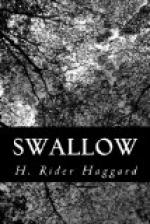So we trekked with the moon, Gaasha guiding us, and did not outspan till dawn. As I have said, we had no horses, but never until I made that journey did it come home to me how slow are oxen, for never before then was I in a hurry, nor, indeed, have I been since that time. It is the Englishmen who are always in a hurry, and that is one of the reasons why we Boers are so superior to them, and when we choose can master them in everything, except shopkeeping, and especially in fighting. Well, at the best the cattle could not drag the waggon over the roadless veldt at a greater rate than two miles an hour, or cover more than twenty miles a day in all. It was pitiful to see Ralph’s impatience; again and again he walked on and returned; indeed, had we allowed it, I think that he would have pressed forward on foot, leaving us to follow in the waggon.
At daylight on the third day we inspanned as usual, and trekked through the morning mists until the sun sucked them up. Then Gaasha, who was sitting on the waggon-box beside Ralph, touched his shoulder, and pointed before him. Ralph looked, and far away upon the plain saw what seemed to be a white cloud, above which towered the flat cliffs of a mountain of red rock.
“See, Baas,” he said, “yonder is Umpondwana, my home, and now by nightfall I shall know whether my parents are still alive, or, if they are dead, whether they have left any cattle that I can claim by law,” and he began to whistle cheerfully.
“And I,” said Ralph aloud, “shall know whether my life is to be a heaven or a hell,” and all day long, neither eating nor drinking, he sat upon the waggon-box and stared at the mountain, not lifting his eyes from it.
It was about one o’clock in the afternoon when we seemed to be quite close to the green flanks of Umpondwana, that of a sudden we cut a wide spoor trampled by thousands of naked feet. Jan and Gaasha got off the waggon to examine it, but Ralph did not move.
“An impi has passed here,” said Jan presently.
“Yes, and a Zulu impi as I think, Baas, but more than one whole day ago,” and Gaasha began to hunt about amongst some low bushes which grew near the trail. Presently he held up his hand and shouted, and Jan ran to him.
“Look, Baas,” he said, pointing to a bush.
Jan looked, and there beneath the bush lay a man, a Zulu soldier, for his tall grey plume was still fixed upon his head, and near him was his broad assegai. At that moment the man, who was still alive, although he was very near his death from dysentry, seemed to hear, for he sat up and opened his eyes, saying, “Manzie, umlungho, manzie.” (Water, white man, water.)
“Bring a pannikin of water, here lies a sick Kaffir,” shouted Jan to Ralph, who was still seated on the waggon-box staring at the mountain.
Ralph brought the water, and the soldier drank it greedily.
“Who are you, and how come you here?” asked Jan.




